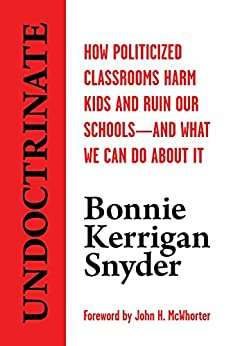The Volokh Conspiracy
Mostly law professors | Sometimes contrarian | Often libertarian | Always independent
The Exploitation of Young Minds
How indoctrination shortchanges K-12 students.

At the Foundation for Individual Rights in Education (FIRE), our longstanding concerns about the deteriorating free speech culture in higher education led to the suspicion that many of these pernicious problems originate before students ever set foot on campus. This spurred us to expand our organizational aims to include high school outreach, in order to teach younger students the value and importance of their — and their peers' — precious First Amendment rights.
From coast to coast, we're seeing documented cases of heavy-handed thought reform efforts in K-12 education that substantiate our long held concerns. A situation that has been festering for decades at a level of low-grade chronicity reached acute levels this past school year, as demonstrated by levels of school board engagement and vituperation that we haven't seen before in our lifetimes.
Paying attention to the K-12 landscape uncovers problematic patterns ranging from activist educators rebelling against traditional ethical restraints to a willingness to denigrate anyone — including children — who dares to verbalize doubt, disagreement, or even lack of sufficiently enthusiastic proactive agreement. Some assertive teachers are hanging uncomfortably presumptive "We Believe" posters in their classrooms while some schools — mainly private — have adopted highly prescriptive collective belief statements or commitments with insufficient discussion or buy-in from the school community.
It certainly doesn't help that the training new teachers receive is so precipitously one-sided, as we discussed in a recent podcast episode with English professor Lyell Asher, writer of an important article in the Chronicle of Higher Education about the steepening tilt of American Education Schools.
Then, there's the impact of the teacher unions, who can make it very difficult for conflicted teachers to dissent when they take official, unilateral stands on charged political issues, such as supporting Black Lives Matter at school or resolving that educators "must acknowledge" the existence of white supremacy culture as a primary root cause of racism and white privilege.
Already, this school year, we've seen the Tik Tok teacher who giggled about removing the American flag from her classroom because it made her "uncomfortable" and suggested that students could instead face a gay pride flag she had hung in her classroom while saying the pledge. Then there was the chemistry teacher who defiantly dared her students to report her to her supervisors after she went on a tangential rant about the former president, the unvaccinated, and climate change while informing her class that they don't have to do what their parents say because "most of y'all parents are dumber than you." She also took care to warn students who disagree with her opinions to "keep it quiet" or risk open ridicule. Students accepted her challenge to "tattle" on her, and she was relieved of her teaching duties.
And then there's the high school history teacher caught on tape explaining how he uses his access to children to radicalize them: "I have 180 days to turn them into revolutionaries," he said, directing attention to the Antifa flag on his classroom wall. Instead of a picture of the current or former presidents of the United States, he also used a portrait of Mao to decorate his room. He boasts of using the lure of extra credit and intimidation ("scare the f*ck out of them") to recruit students to events promoting causes he supports.
And while these teachers openly shared what they are up to in their classes (although some apparently were filmed without their knowledge); in other cases, teachers and even districts have been caught concealing their ideological commitments and curricular aims from parents in a tremendous breach of fiduciary trust, and in complete abandonment of the principle of acting in loco parentis. It's hard to imagine a more effective way to pit parents against teachers and schools and to corrode the trust upon which support for K-12 education depends.
As FIRE's Director of High School Outreach, I have the opportunity to speak with students, parents, and concerned educators throughout the country, at disciplinary and other events where teachers gather. From this vantage point, I've collected an amazing array of stories and assembled moral, legal, philosophical, pedagogical, emotional and developmental arguments explaining why current teaching enthusiasms often fall short of exemplary practices and undermine the goal of cultivating critical thinkers capable of self-government in a democratic society.
While it will always be tempting for some educators and school authorities to exploit their access to other citizens' children to attempt to enact cherished partisan ends, we must restore the Golden Rule to our pedagogical practices: Do not do to your neighbors' children what you would not have them do to yours. This means respecting your neighbors' rights to impart their own values and ethics to their own children, the same way that you would expect them to respect your right to do the same, even when you may profoundly disagree with those parents' politics or outlook.
In the next installment, we'll take a look at some K-12 lawsuits that have recently been filed and at legislative efforts to rein in so-called "divisive concepts" (also known as "anti-CRT" bills) in American schools.


Show Comments (37)